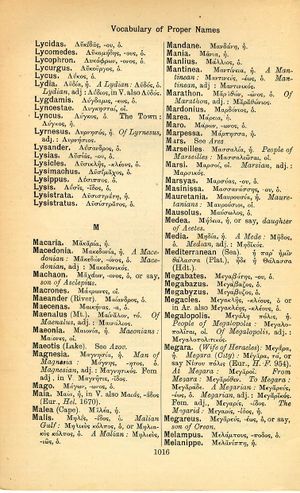Lysias: Difference between revisions
Οὕτως γὰρ ἠγάπησεν ὁ Θεὸς τὸν κόσμον, ὥστε τὸν Υἱὸν τὸν μονογενῆ ἔδωκεν, ἵνα πᾶς ὁ πιστεύων εἰς Αὐτὸν μὴ ἀπόληται ἀλλ᾽ ἔχῃ ζωὴν αἰώνιον → For God so loved the world that he gave his only begotten Son that whosoever believeth in him should not perish but have everlasting life (John 3:16)
m (Text replacement - "link={{" to "link={{") |
m (Text replacement - "(|thumb)\n(\|link=)" to "$1$2") |
||
| Line 1: | Line 1: | ||
{{WoodhouseENELnames | {{WoodhouseENELnames | ||
|Text=[[File:woodhouse_1016.jpg|thumb | |Text=[[File:woodhouse_1016.jpg|thumb|link={{filepath:woodhouse_1016.jpg}}]]Λυσίας, -ου, ὁ. | ||
|link={{filepath:woodhouse_1016.jpg}}]]Λυσίας, -ου, ὁ. | |||
}} | }} | ||
{{Lewis | {{Lewis | ||
Revision as of 17:00, 18 May 2020
English > Greek (Woodhouse)
Λυσίας, -ου, ὁ.
Latin > English (Lewis & Short)
Lysĭas: ae, m., = Λυσίας.
I Son of Cephalus, a famous orator of Athens: tum fuit Lysias, quem jam prope audeas oratorem perfectum dicere, Cic. Brut. 9, 35; cf. id. ib. 85, 293; id. de Or. 1, 54, 231; id. Or. 9, 29; Quint. 10, 1, 78; 12, 10, 24.—Hence,
B Lysĭăcus, a, um, adj., of or belonging to the orator Lysias: gracilitas, Quint. 12, 10, 24.—
II A physician, Cels. 5, 18.—
III A celebrated sculptor, Plin. 36, 5, 4, § 2.
Latin > French (Gaffiot 2016)
(1) Lȳsĭăs, ădis, f., ville de Phrygie : Plin. 5, 108.
(2) Lȳsĭās,¹⁴ æ, m. (Λυσίας), célèbre orateur athénien : Cic. Br. 35 || autres du même nom : Cels. Med. 5, 18 ; Plin. 36, 2.
Latin > German (Georges)
Lȳsiās, ae, Akk. am u. ān, m. (Λυσίας), ein berühmter Redner zu Athen, Zeitgenosse des Sokrates, Cic. de or. 2, 93; Brut. 63. Quint. 10, 1, 78. – Dav. Lȳsiacus, a, um (Λυσιακός), lysiakisch, des Lysias, Quint. 12, 10, 24.

